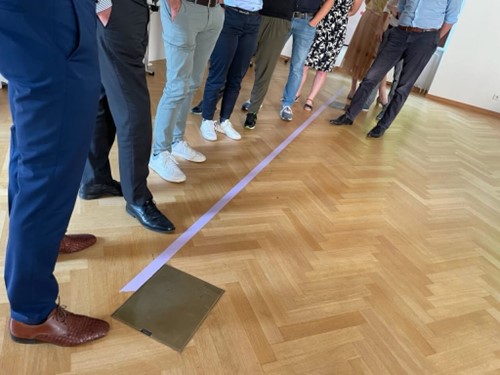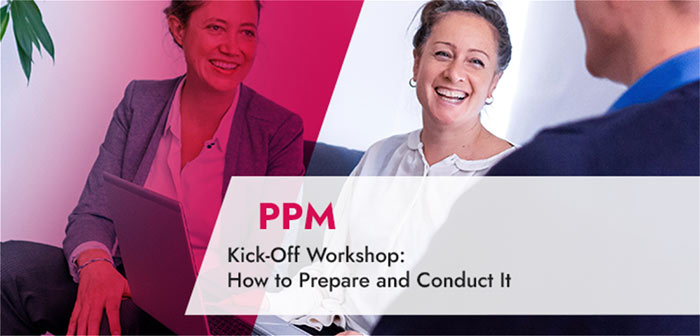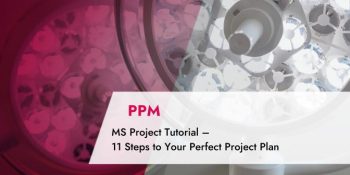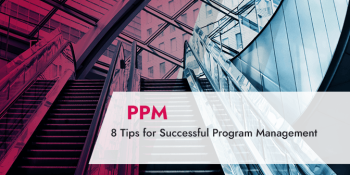A well-organized kick-off workshop is an aha experience and the cornerstone of a successful project. The kick-off workshop is the key moment mentioned in the well-known saying:
“Show me how your project starts, and I will tell you how it will finish.”
This article will give you practical tips on how to design and conduct a kick-off workshop that makes an impact. The following chapters are waiting for you:
- Why is a kick-off workshop important?
- What is the goal of a kick-off workshop?
- The basic outline of the kick-off workshop
- Practical delivery of a kick-off workshop
- Dealing with the challenges
- Follow-up of the kick-off workshop
- Conclusion
Let us start.
Why Is a Kick-Off Workshop Important?
A kick-off workshop is more than just a meeting – it is an opportunity for you to define your project and create a shared momentum.
It is your first and best occasion to inspire enthusiasm, build trust and lay the foundations for successful collaboration.
Therefore, be careful in planning and conducting your workshop.
What is the Goal of a Kick-Off Workshop?
In addition to the factual level, the participants – usually at least the customer, the internal sponsor and the core team – are to be addressed mainly on an emotional level.
In this respect, it is helpful to bear in mind that typically the following triggers have a good effect:
- In addition to anticipating the benefits of the project result, the customer should mainly experience a sense of security.
- Internal sponsors get a good feeling when they perceive the commitment and will of the project team. They put their faith in the right people.
- The active members of the project team should start with a feeling of pleasant anticipation and pride in belonging to this team.

At the end of the workshop, all participants should be aware of the next steps in this project. In that case, you will have achieved a lot already.
You might also like this article: Stakeholder Management in Projects
The Basic Outline of the Kick-Off Workshop
The approach to workshops that will linger in the memory is based on the 4Mat model. This method answers the following questions:
- Why are we doing this?
- What are we doing?
- How are we doing it?
- And what if we do not do it?
This is a closer look at the four key questions that coincidentally form the basis of the 4 phases of the kick-off workshop.
-
Why Are We Doing This?
This question addresses the actual purpose of the project. It aims to convey the “why” behind the project. At the same time, this phase makes it clear to the attendants just how important their active participation is for the success of the project. Make sure you address the benefits the project will provide to the customer.
Our tip: Make the benefits “comprehensible”. A physical example or an authentic testimonial make the participants experience what is at stake. The more tangible, the better. For instance, ask one of the service employees affected to bring along the faulty component that gave rise to their product development project.
-
What Are We Doing?
This question is concerned with the expected results. What is written down in the project goals? What subgoals are we pursuing? And how do these goals rank in relation to each other? Talk to those present about the project classification as well (new vs. familiar as well as straightforward vs. complex). In doing this, you are already setting the course for the type of project setup you will choose. Lastly, determine how the project fits into the overall strategy of the company.
-
How Are We Doing It?
This question addresses the organization of the project. This includes the project plan, roles, expectations regarding collaboration and so on. Here, you should at least present a rough milestone plan or, even better, create one interactively with the attendants. Derive your project approach based on the project classification, and clarify the distribution of the roles within the team accordingly. You should also make the budget and the open issues regarding project organization transparent in this phase.
Our tip: Besides the typical presentation of already defined key points, you should plan interactive parts: for example, a scale survey on the quality of the planning – possibly also as a line-up in the room. Make sure you do not get lost in the details but take down and address open issues.
-
What If Not?
As a last point, you should address the risks of the project. What challenges could arise and how would you master these? Make it very clear that risk management in project management is a key priority for you and that measures and responsible roles must be defined accordingly. In this phase, you may want to point to open questions again and give an outlook on when the answers will be worked out.
Our tip: After the fourth phase, go back to the first phase and close the session with the reversal of the why question: the “what for?” These are the benefits for the customer.
Another interesting read: Risk Management in Project Management
Practical Delivery of a Kick-Off Workshop
The kick-off workshop should be interactive to achieve a high level of participation from the attendees. A warm-up that is related to the project goal is a useful approach with which you can start the workshop.
Example: For a marketing and sales project, two plates with apples, oranges and melons are passed around at the beginning. The first plate carries the fruit in one piece, the second in bite-sized chunks. Then, talk about the typical reflex that we tend to reach for the little bites. With our project, we want to create this same effect for the products of the company.
Interactive elements such as quizzes or more complex simulations can also help increase the engagement.
Important note: Always make a meaningful connection to the topic. No exercise just for the sake of exercise!

Reading tip: The role clarification workshop also takes place at the beginning.
Dealing with the Challenges
Openness and transparency are essential for project success. If critical questions or unexpected insights arise during the workshop, see this as a chance.
This will help identify and clarify misunderstandings and possible risks at an early stage. That is a real win.
Explain to the participants that open communication and constructive criticism are welcome. Encourage them to voice their thoughts and concerns.
Our tip: With questions that rattle you, it is best to pass them on to another core team member or ask a counter question. This will give you time to briefly think about the issue yourself. In this way, you not only come across as confident – you stay that way.
If you want to learn more, read our article about Project Success.
Keep the Energy High
A successful kick-off workshop is not only instructive but also inspiring. As a facilitator, it is your job to keep the energy in the room high and the participants engaged in the topic. Avoid monotonous lectures and foster a dynamic and energetic event instead.
To achieve this, it helps to work out the agenda together with the core team beforehand. Ideally, you keep passing the “ball” of moderation to the members. This also makes it easy to change modes (lecture, individual and team work).
Our tip: If you are using different media (always easier on site), consider how much really needs to be in PowerPoint. Where could you switch to flip charts, meta-plan walls or even windows on which you write live?
The Location
“A magic dwells in each beginning.” Hermann Hess knew this, and you can use this for yourself.
If a kick-off workshop for your project takes place outside the usual conventions, you are sure to get extra attention.

To ensure this works well and is in line with the concept, you should establish a connection between the location or the chosen setting and the project.
Examples:
- Your kick-off workshop takes place in a prepared part of the production hall because you want to inspect the production line which is to be optimized with the participants. You also want them to see it during the meeting.
- Your workshop takes place off-site in a lakeside hotel because you want to draw attention to your project’s aim of reaching new shores.
Download now: Free eBook (PDF) on “The PPM Paradise”
Here is what an optimal customizable solution for project, portfolio and resource management (PPM) should be capable of – tips and important arguments for your decision-makers. > Download eBook (PDF) “The PPM Paradise”
Follow-Up of the Kick-Off Workshop
After the kick-off workshop, it is important to summarize the results and agreements and send them to all participants. Especially to-dos and deadlines are to be communicated.
Moreover, you should obtain the participants’ feedback to learn what went well and what could be improved in future workshops.
Our tip: A good photographic record is legible or otherwise post-edited. It includes all phases and outcomes of the workshop. For this purpose, ensure you also take pictures of the people during the exercises and obtain permission to share the images.
Conclusion – Kick-Off Workshop
An effective kick-off workshop paves the way for a successful project. It is motivating and noticeably promotes open interaction with each other. The secret: to achieve this, you have to engage people on many levels in the workshop and drive the following message home: off we go!
We wish you a lot of success and fun in implementing your next workshop and would like to draw your attention to this German-language TPG podcast on the same topic.
Our final tips
Get to know the individually adaptable “PPM Paradise” – the optimal environment for your enterprise-wide project, program, portfolio and resource management (PPM). Download the free eBook “The PPM Paradise” now (just click, no form).
And sign up for our bi-weekly blog newsletter with information on more practical articles, eBooks, etc. to improve your project management maturity level.
Any questions or insights you would like to share about the kick-off workshop? We look forward to reading your comment below the post.
Subscribe to TPG BlogInfo: Never miss new practice-oriented tips & tricks
Every other week: Receive practical tips in TPG blog posts written by recognized experts in project, portfolio, and resource management.
* Required Fields | Data Protection
About the author Tobias Lienhard
Tobias Lienhard knows how to successfully inspire project managers for their own work and their project. With his approach of #ProjectFacilitation, he manages to set off the right triggers quickly, so that momentum and creativity spill over to the project team. The project managers and participants feel project frustration evaporate and team success gradually set in.
Read more about Tobias Lienhard on LinkedIn.







